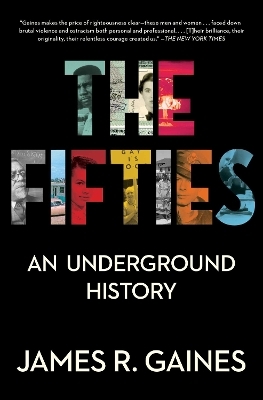
The Fifties
An Underground History
Seiten
2023
Simon & Schuster (Verlag)
978-1-4391-0164-3 (ISBN)
Simon & Schuster (Verlag)
978-1-4391-0164-3 (ISBN)
From historian Jim Gaines, a bold and original argument that the fifties were not the decade of group-think and conformity we remember them to be, but instead the moment when the radical movements of late 20th century America were born, thanks to a half- dozen solitary, gifted, and stubborn pioneers.
An “exciting and enlightening revisionist history” (Walter Isaacson, #1 New York Times bestselling author) that upends the myth of the 1950s as a decade of conformity and celebrates a few solitary, brave, and stubborn individuals who pioneered the radical gay rights, feminist, civil rights, and environmental movements, from historian James R. Gaines.
An “enchanting, beautifully written book about heroes and the dark times to which they refused to surrender” (Todd Gitlin, bestselling author of The Sixties). In a series of character portraits, The Fifties invokes the accidental radicals—people motivated not by politics but by their own most intimate conflicts—who sparked movements for change in their time and our own. Among many others, we meet legal pathfinder Pauli Murray, who was tortured by both her mixed-race heritage and her “in between” sexuality. Through years of hard work and self-examination, she turned her demons into historic victories. Ruth Bader Ginsburg credited her for the argument that made sex discrimination unconstitutional, but that was only one of her gifts to the 21st-century feminism. We meet Harry Hay, who dreamed of a national gay rights movement as early as the mid-1940s, a time when the US, Soviet Union, and Nazi Germany viewed gay people as subversives and mentally ill. And in perhaps the book’s unlikeliest pairing, we hear the prophetic voices of Silent Spring’s Rachel Carson and MIT’s preeminent mathematician, Norbert Wiener, who from their very different perspectives—she is in the living world, he in the theoretical one—converged on the then-heretical idea that our mastery over the natural world carried the potential for disaster. Their legacy is the environmental movement.
The Fifties is an “inspiration…[and] a reminder of the hard work and personal sacrifice that went into fighting for the constitutional rights of gay people, Blacks, and women, as well as for environmental protection” (The Washington Post). The book carries the powerful message that change begins not in mass movements and new legislation but in the lives of the decentered, often lonely individuals, who learn to fight for change in a daily struggle with themselves.
An “exciting and enlightening revisionist history” (Walter Isaacson, #1 New York Times bestselling author) that upends the myth of the 1950s as a decade of conformity and celebrates a few solitary, brave, and stubborn individuals who pioneered the radical gay rights, feminist, civil rights, and environmental movements, from historian James R. Gaines.
An “enchanting, beautifully written book about heroes and the dark times to which they refused to surrender” (Todd Gitlin, bestselling author of The Sixties). In a series of character portraits, The Fifties invokes the accidental radicals—people motivated not by politics but by their own most intimate conflicts—who sparked movements for change in their time and our own. Among many others, we meet legal pathfinder Pauli Murray, who was tortured by both her mixed-race heritage and her “in between” sexuality. Through years of hard work and self-examination, she turned her demons into historic victories. Ruth Bader Ginsburg credited her for the argument that made sex discrimination unconstitutional, but that was only one of her gifts to the 21st-century feminism. We meet Harry Hay, who dreamed of a national gay rights movement as early as the mid-1940s, a time when the US, Soviet Union, and Nazi Germany viewed gay people as subversives and mentally ill. And in perhaps the book’s unlikeliest pairing, we hear the prophetic voices of Silent Spring’s Rachel Carson and MIT’s preeminent mathematician, Norbert Wiener, who from their very different perspectives—she is in the living world, he in the theoretical one—converged on the then-heretical idea that our mastery over the natural world carried the potential for disaster. Their legacy is the environmental movement.
The Fifties is an “inspiration…[and] a reminder of the hard work and personal sacrifice that went into fighting for the constitutional rights of gay people, Blacks, and women, as well as for environmental protection” (The Washington Post). The book carries the powerful message that change begins not in mass movements and new legislation but in the lives of the decentered, often lonely individuals, who learn to fight for change in a daily struggle with themselves.
James R. Gaines is the former managing editor of Time and the author of several books, including Evening in the Palace of Reason, a study of Johann Sebastian Bach and the early Enlightenment, and For Liberty and Glory: Washington, Lafayette, and Their Revolutions. He lives in New York and Los Angeles.
| Erscheinungsdatum | 25.01.2023 |
|---|---|
| Zusatzinfo | b&w photos throughout |
| Verlagsort | New York |
| Sprache | englisch |
| Maße | 140 x 213 mm |
| Gewicht | 259 g |
| Themenwelt | Literatur ► Biografien / Erfahrungsberichte |
| Sachbuch/Ratgeber ► Geschichte / Politik | |
| Geisteswissenschaften ► Geschichte ► Regional- / Ländergeschichte | |
| Geschichte ► Teilgebiete der Geschichte ► Kulturgeschichte | |
| ISBN-10 | 1-4391-0164-7 / 1439101647 |
| ISBN-13 | 978-1-4391-0164-3 / 9781439101643 |
| Zustand | Neuware |
| Informationen gemäß Produktsicherheitsverordnung (GPSR) | |
| Haben Sie eine Frage zum Produkt? |
Mehr entdecken
aus dem Bereich
aus dem Bereich
der stille Abschied vom bäuerlichen Leben in Deutschland
Buch | Hardcover (2023)
C.H.Beck (Verlag)
CHF 32,15
vom Mittelalter bis zur Gegenwart
Buch | Softcover (2024)
C.H.Beck (Verlag)
CHF 16,80


